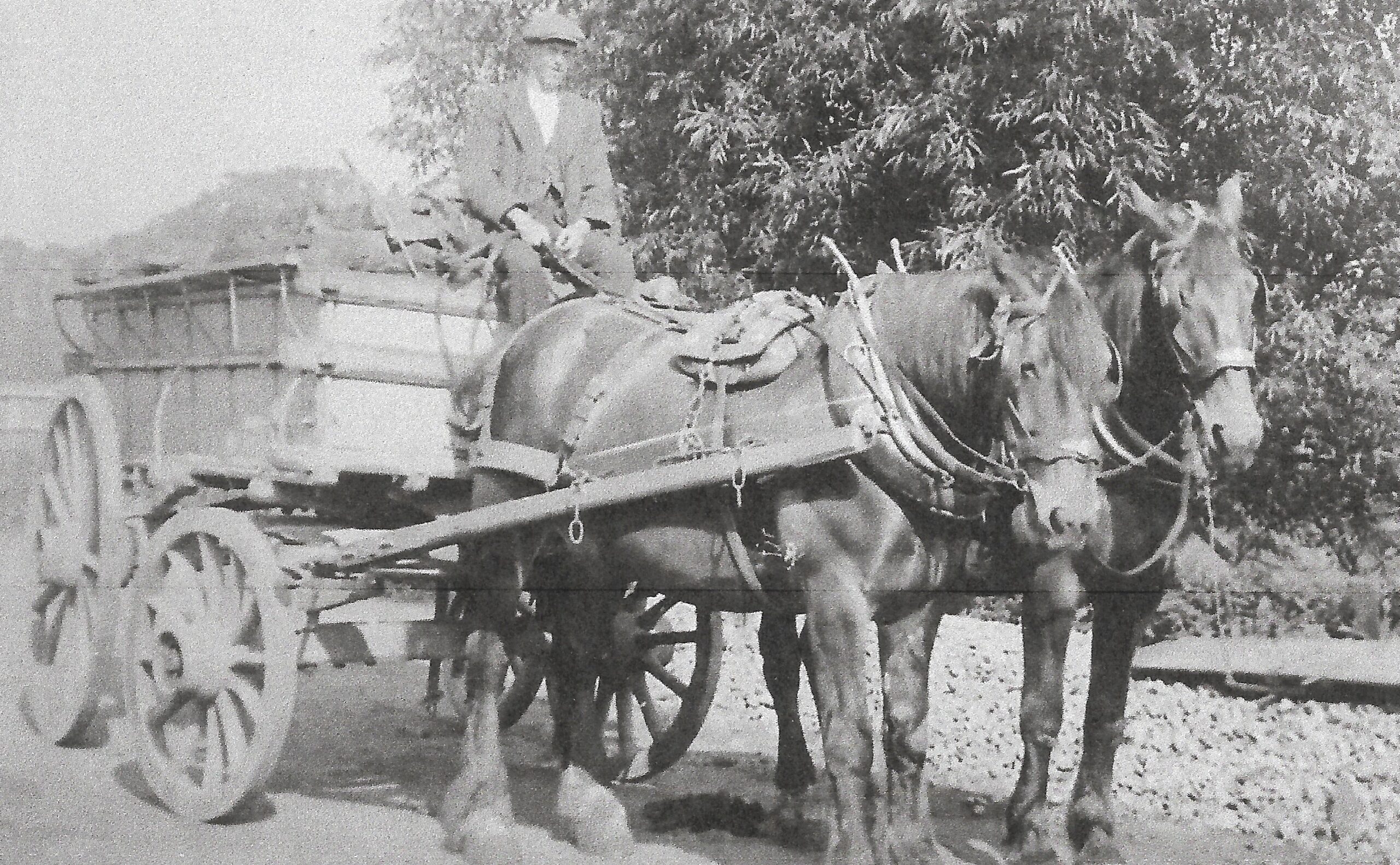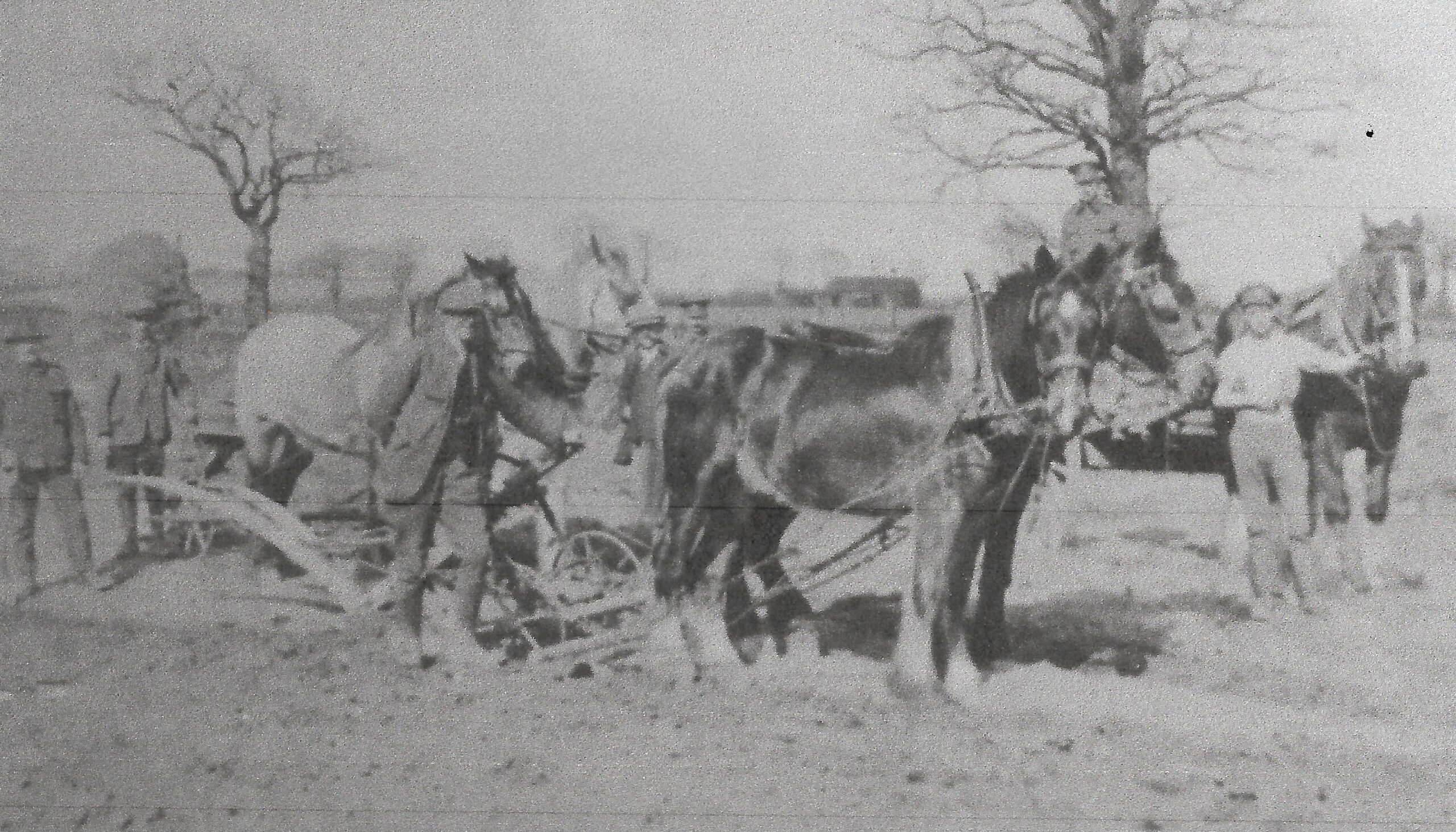These family memories and the photographs have been provided by Sue Tibbenham and paint a vivid picture of work at the former St Andrew’s Mental Hospital during the First World War and after. We are grateful to Sue for allowing us to use them.
I have some family memories revolving round St Andrew’s Hospital as my grandfather, father and uncle worked there,. My mother’s name was Alice Clarke (née Bussey) I am her daughter Susan Tibbenham. Her brother was Henry Bussey (junior) who gives a good account of life between the wars in Thorpe St Andrew and the prevalent poverty, on your website. Her younger brother, William, also worked there.
I have in my possession two postcard images taken during the First World War of Norfolk County Asylum’s farm workers. One is of Henry Bussey, my grandfather, who is driving two horses and a cart. The other is of him and hospital farm workers ploughing. (Henry third from left) The peaked cap is recognisable as part of the hospital uniform. I have no idea why these were taken, but by a process of elimination it must have been during the First World War. If you squint hard enough the, then tall, spire of Thorpe church can be seen in the background.
During the war Alice Bussey’s father, Henry Bussey, could not enlist due to the loss of two fingers on his right hand due to an agricultural accident, so took work at the Great Hospital in the place of another military enlister. Henry was very good with horses and this was probably due to having to sleep with them in nearby stables in his youth, along with his brothers, due to appalling overcrowding at home in Great Plumstead. He was one of nine siblings in a two up and two down cottage. His main job was transporting coal by horse and cart from Whitlingham Station to St Andrews, then a War Hospital, to fuel the steam generator to make electricity. The hospital was locally known as ‘The Building’ as it looked so grim and foreboding. The tall chimney belched black smoke day and night. At this time screams could be heard on the north side from shell shocked patients – casualties of the war.
The Bussey family lived in a semi detached tied cottage (still there) immediately east of the railway bridge and owned by the hospital. It was here Alice came into the world in 1916, all two and a half pounds of her, followed by her two brothers, Henry and William.
Alice’s first memory is of sitting under the kitchen table knowing something dreadful was happening…..the soldier had returned from the war and wanted his job back so Henry was out of a job and the family a home. The bailiffs came and all their possessions were stacked under the railway arch and the family split up and spread throughout Thorpe amongst kind friends and relatives. William Bussey, Alice’s younger brother, went on to do clerical work at the hospital.
My father was Percy Clarke who worked as a Mental Nurse and later, Charge Nurse from the mid 1930s until 1966, at North side. My mother said whenever a physical job needed doing at the hospital, my father was always summoned, probably because he was quite a large framed man. I have heard from an ex patient that he was excellent at his job, but it was no bed of roses working there during the Second World War. He worked nights for three years. When a bombing raid came, as there were no air raid shelters for patients, it was a case of being locked in with a ward of ninety plus patients with one young and one elderly assistant and hoping for the best. There were no tranquillisers to subdue patients then and they were really mad. I remember dad showed me the padded cell and straight jacket when he left my birthday present at work and we had to go back and get it. There was an occasion in the fifties, when he was stabbed by a patient, also he had his foot crushed also by a patient. Minimal compensation, no counselling then. My mother said he was never the same afterwards. Shift work had taken its toll on him, contributing to his strokes and decline in health. Towards the end, when my father knew he was dying, as a favour even though he was not mentally ill, he requested to go and be nursed by those work colleagues he knew and trusted, and so it was, in 1981, he passed away at St Andrew’s.
Submitted by Sue Tibbenham, courtesy Thorpe History Group, September 2024. Photos supplied by contributor.








